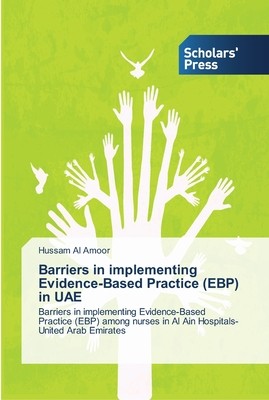
- We will send in 10–14 business days.
- Author: Hussam Al Amoor
- Publisher: Scholars' Press
- Year: 2015
- Pages: 120
- ISBN-10: 3639766385
- ISBN-13: 9783639766387
- Format: 15.2 x 22.9 x 0.7 cm, softcover
- Language: English
- SAVE -10% with code: EXTRA
Barriers in implementing Evidence-Based Practice (EBP) in UAE (e-book) (used book) | bookbook.eu
Reviews
Description
The purpose of this study was to analyze and assess the nurses' perceived barriers to Evidence Based Practice (EBP) implementation in Al Ain hospitals. The setting of this study takes place in two major private hospitals in Al Ain city- United Arab Emirates. A descriptive, cross-sectional research study was conducted in 2014 with a non-random convenient sample of 88 nurses (40% of the target population) at two major private hospitals in Al Ain- United Arab Emirates. The response rate was 63%. The survey used in this study was the BARRIERS Scale which was developed by Funk, Champagne, Wiese and Tornquist (1991b). The results of the study indicated that the greatest barrier to Evidence Based Practice implementation was "Physicians will not cooperate with implementation". This barrier pertains to the characteristics of the setting factors. The next greatest barrier was from the presentation factor characteristic, "The research is not reported clearly and readably". The third and the fourth greatest barriers had the same mean. These two were "Research reports/articles are not readily available" and "Administration will not allow implementation".
EXTRA 10 % discount with code: EXTRA
The promotion ends in 18d.06:08:00
The discount code is valid when purchasing from 10 €. Discounts do not stack.
- Author: Hussam Al Amoor
- Publisher: Scholars' Press
- Year: 2015
- Pages: 120
- ISBN-10: 3639766385
- ISBN-13: 9783639766387
- Format: 15.2 x 22.9 x 0.7 cm, softcover
- Language: English English
The purpose of this study was to analyze and assess the nurses' perceived barriers to Evidence Based Practice (EBP) implementation in Al Ain hospitals. The setting of this study takes place in two major private hospitals in Al Ain city- United Arab Emirates. A descriptive, cross-sectional research study was conducted in 2014 with a non-random convenient sample of 88 nurses (40% of the target population) at two major private hospitals in Al Ain- United Arab Emirates. The response rate was 63%. The survey used in this study was the BARRIERS Scale which was developed by Funk, Champagne, Wiese and Tornquist (1991b). The results of the study indicated that the greatest barrier to Evidence Based Practice implementation was "Physicians will not cooperate with implementation". This barrier pertains to the characteristics of the setting factors. The next greatest barrier was from the presentation factor characteristic, "The research is not reported clearly and readably". The third and the fourth greatest barriers had the same mean. These two were "Research reports/articles are not readily available" and "Administration will not allow implementation".


Reviews